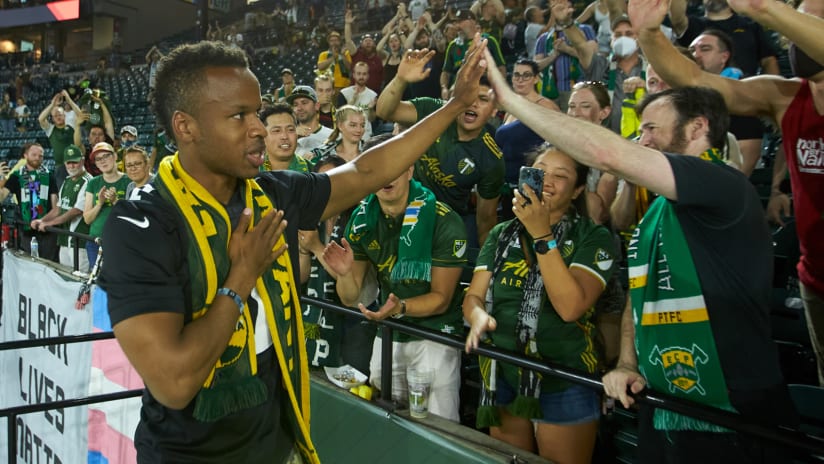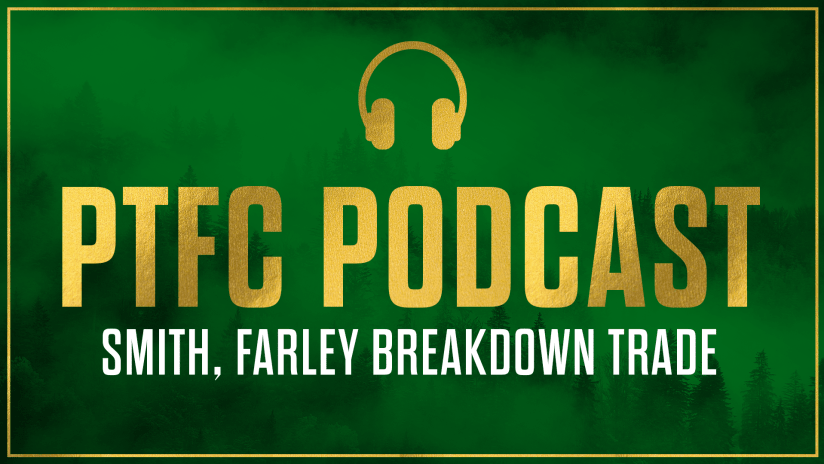PORTLAND, Ore. — Jeremy Ebobisse’s time with the Portland Timbers is done. As announced by the club on Thursday, the 24-year-old forward has been traded to the San Jose Earthquakes. In exchange, the Timbers will receive just over $1.1 million in general allocation money.
In his four-and-a-half years as a Timber, Ebobisse scored 26 goals in 88 regular-season games. He was a prominent part of teams that won the 2020 MLS is Back tournament and MLS’s Western Conference in 2018, and since breaking into the team’s starting lineup in like 2018, Ebobisse has been one of Portland’s most valuable players.
“The decision to trade a player that’s had Jeremy Ebobisse’s impact can never be taken lightly," Timbers president of soccer Gavin Wilkinson said in the team's Thursday announcement. "We know what he has meant to our team, club, and community."
Ebobisse’s departure reflects Portland’s complex salary-cap dynamics as well as a series of unplanned obstacles. Upon signing a contract extension with the Timbers before the 2020 season, both team and player expected he would move to Europe. When COVID-19 put the world on pause last spring —and injuries complicated Ebobisse’s end of 2020 and beginning of 2021 — the right opportunity never surfaced. As the Timbers prepared their roster for his departure, Ebobisse stayed in Portland.
Eventually, both sides ran out of time. Facing the need to manage the team’s salary cap in future seasons, Portland has traded Ebobisse to a team that can fulfill one his objectives. On the Timbers, he was battling forwards brought in to compensate for his expected departure: Felipe Mora and Jaroslaw Niezgoda. With the San Jose Earthquakes, he’ll have more opportunities to play his natural position.
"Our partnership with Jeremy has always been true to what’s best for all parties," Wilkinson said. "This decision allows Jeremy to continue pursuing his career objectives while putting this club in a stronger position to manage its roster commitments going forward through acquiring a considerable amount of allocation money.
“I want to thank Jeremy for everything he contributed to make the Timbers a better club on and off the field during this four-and-a-half years in Portland.”
Why this move matters for Ebobisse and the Timbers comes down to a combination of sadness and opportunity, even if in the moments after it's become official, the sadness feels more acute. But there is a reason why all three sides of this deal wanted it to happen. Ultimately, the realities of a salary-capped league caught up to “Jebo’s” time in Portland.
How We Got Here
To understand why today’s trade happened, it’s best to look at Ebobisse’s time in Portland in two parts: from 2017 through the end of 2019, when he earned the new contract he’d sign before the 2020 season; and from 2020 to now, when he and the team worked to make a different move possible.
- FLASHBACK, 2017: The day Ebobisse became a Timber
In 2019, Ebobisse enjoyed a breakthrough, building on the starting role he earned at the end of 2018 to post an 11-goal season. It was one of the first payoffs of a journey that began with mostly substitute appearances as a rookie, shifted to Timbers 2 at the beginning year two, and blossomed into a regular role in his third year as a pro. As he proved himself in MLS, he also proved he was worthy of a new deal.
With one year left on his first contract, Ebobisse and the Timbers agreed on an extension in early 2020, though the deal came with a plan of how both sides would move forward. Portland was aware of Ebobisse’s hope of moving abroad, and they committed to helping him get there. In anticipation of that move, Mora was brought in on loan from Mexico, augmenting a depth chart that had already added Niezgoda.
When the world shut down in early 2020, the momentum behind Ebobisse’s move did, too. Unfortunately, it’s never fully been rekindled. Though multiple teams have expressed interest in Ebobisse, no move seemed to make more sense than staying the course in Major League Soccer and trying to get back to where things were before COVID changed the world.
In the end, Ebobisse and the Timbers needed to move on. The forwards Portland had brought in preparing for his departure had crowded the depth chart at his natural position, while the costs of maintaining an overstocked attack were becoming too much. The Timbers felt they could not go into the offseason without more resources to sustain their roster. With Thursday’s trade, the team restocked those resources.
Why This Matters for the Timbers
As the deal is structured, the Timbers are getting large amounts of general allocation money in each of the next two seasons. That money can be used to extent the team’s budget by cancelling out some costs against the salary cap. Plus, because Major League Soccer keeps a percentage of transfer fees when players are sold outside the league, trading Ebobisse for GAM keeps the Timbers from having to pay a tax, of sorts, on their player’s sale.
Undoubtedly, though, the current Timbers are in a weaker place because of this news. You can’t acknowledge how valuable Ebobisse’s been to the Timbers without also recognizing how much his departure hurts. There is a reason why, last year, Ebobisse set a Timbers record for most consecutive games played. Every matchday, there is a way in which he can be valuable.
- FLASHBACK, 2018: Ebobisse seizes opportunity in starting role
Now the Timbers need other players to step up, and the most obvious way is through health. That means Niezgoda returning to full strength from his anterior cruciate ligament recovery this summer. That means Sebastián Blanco continuing his progress to being 90-minutes fit. Add in the eventual arrival of Santiago Moreno, who was signed last week from Colombia’s América de Cali, and the Timbers will have enough ways to compensate for Ebobisse’s departure on the field.
In other facets, replacing Ebobisse might be harder. Within the team environment, Jebo had become one of the Timbers’ two most consistent players, augmenting any ebbs or flows in his goal-scoring form with reliability in other areas. There was never any doubt what Portland would get from Ebobisse on the field, and with that consistency, Ebobisse became a leader. Only Diego Chara was a more reliable part of the Timbers’ core.
Those standards were also present off the field. Ever since gaining the public eye when he turned pro, Ebobisse has shown a commitment to raising consciousness of a number of social issues. Most prominently, he’s confronted people with the realities of what it means to be Black in America, showing not only his dedication to relaying our country’s history but also his understanding of the U.S.’s most complex social problems. Just as he challenged the public to confront issues they were ignoring, so too did he challenge his teammates, as well as the rest of his club. His commitment away from the field was as enduring as his dedication on.
The Timbers can find other players, but they can’t find another Jebo. Losing the person will be the hardest part.
Why This Matters for Ebobisse
In terms of Ebobisse, this feels brutal, even if this might be the beginning of something positive. If he wants to be in a place where his primary role is playing forward, and he sees that role as the best way to open his career's next doors, this is a worthwhile move. In the process, though, he’s been uprooted, is relocating to a new city, and having to reestablish himself in a new culture.
This is the reality athletes in this country sign up for when they’re drafted onto teams. To the extent that’s fair or the result of a negotiated trade off, it only makes moments like these slightly easier. Most Major League Soccer players get compensated at a level that makes these switches easier than they’d be for other people. How much easier, though? Money can only offset for so much.
The next phase for Ebobisse feels like a set of probabilities. What are the chances he settles into San Jose and enjoys his time in a new city? What are the chances he integrates quickly into a new group? What are the chances he gets the platform he needs to flourish, and what are the chances the opportunities he’s earned resurface?
- FLASHBACK, 2018: Ebobisse, Williamson talk representation in soccer culture
Subjectively, it feels like the odds are in his favor. Ebobisse is going to an organization that has enough belief in him that they were willing to give up over a million dollars in allocation money to acquire him. If early reporting bears out, San Jose is also willing to give Ebobisse a new contract with higher wages. There’s commitment there. Head coach Matías Almeyda’s system should highlight all the physical, tactical, and psychological strengths Ebobisse showcased in Portland, and if San Jose ends up using him exclusively at forward, Ebobisse will be showing those strengths in his desired role.
None of the above is a stretch. This is a player that has averaged a goal every 195.7 minutes during his MLS career, doing so while splitting time between forward and wing. He’s also 24. There’s a reason why the Timbers were able to get so much allocation money for Ebobisse, and aside from sports being sports, there’s little reason to believe Ebobisse won’t make the most of his new platform.
What’s Next
With most Why It Matters posts, What’s Next becomes a place to reset risks and rewards. In this instance, though, the risks seem relatively muted, mostly because there are very few unknowns. Portland was able to get a price for Ebobisse that reflects an established, productive player, and while there is a chance the Timbers don’t see other options step up in his place, the team was going to have to try and get the most out of its attacking talent, regardless. The heights of Portland’s 2021 were always going to be defined by the production they got out of players like Blanco and Niezgoda.
For Ebobisse, hopefully what’s next is success. Even though he is no longer a Timber, it’s hard to imagine a Timber fan who doesn’t want the best for a player who was so important. It may have only been four-and-a-half years, but during his time in Portland, Ebobisse made a lasting mark.













